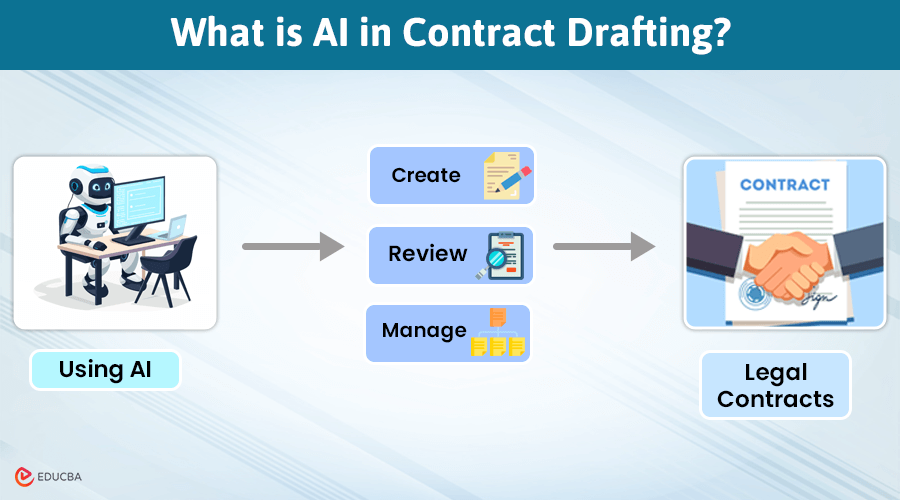
What is AI in Contract Drafting?
AI in contract drafting refers to using artificial intelligence technologies to assist in creating, reviewing, and managing legal contracts.
These technologies often include natural language processing (NLP) and machine learning algorithms that can interpret large volumes of legal text, identify relevant clauses, ensure compliance with legal standards, and suggest edits or improvements to optimize the drafting process. AI in contract drafting aims to streamline and improve accuracy in legal document creation while reducing the time and effort traditionally required by human lawyers.
In this article, we will see how AI can assist in drafting legal contracts. We will also cover popular AI tools and address ethical concerns and challenges in using AI for contract drafting. Check out our AI contract writer resource for more on AI’s role in legal processes.
How AI Writes Legal Contracts?
Artificial Intelligence (AI) writes legal contracts using Natural Language Processing (NLP), which helps it understand and generate legal language.
By studying past contracts and legal documents, AI learns typical clauses and language structures used in various agreements. Machine Learning algorithms actively predict which clauses to include to ensure the contract is thorough and legally valid.
This process enables AI tools to swiftly create standardized contracts, significantly cutting time and easing the workload for legal professionals.
Examples of AI Technologies for Drafting Contracts
AI technologies make drafting contracts easier and more accurate. Here are some of the most effective AI technologies for contract drafting:
1. Natural Language Processing (NLP) Software
NLP Software reads and writes legal text. It analyzes large amounts of legal data to create accurate and context-appropriate contracts. NLP can understand complex legal language, ensuring contracts follow legal standards and include necessary clauses.
2. Machine Learning Algorithms
Machine Learning Algorithms predict needed clauses based on past contracts. They learn from a large dataset of legal documents to identify patterns and suggest suitable language for new contracts. It ensures the contracts are thorough and meet specific legal requirements.
3. Smart Contract Platforms
Smart Contract Platforms use blockchain technology to automate contract execution. These self-executing contracts have terms written into code, automatically enforcing the agreement when it meets the conditions. It reduces the need for intermediaries, making transactions secure and transparent.
Advantages of Using AI in Contract Drafting
1. Efficiency and Speed
AI can draft contracts much faster than humans by effortlessly handling repetitive tasks. This speed allows lawyers to focus on more complex and strategic aspects of their work. By automating routine tasks, AI ensures to create contracts quickly, meeting tight deadlines and boosting overall productivity.
2. Reduced Risk of Errors
Automated checks significantly minimize mistakes, ensuring accuracy in contract terms. AI systems identify inconsistencies, missing information, and potential legal issues, reducing human error. This accuracy enhances contract reliability and upholds high legal documentation standards.
3. Cost-Effectiveness
AI reduces the time lawyers spend drafting, lowering legal costs. It makes legal services more affordable, benefiting small businesses and individuals who might find traditional legal fees prohibitive. AI enables lawyers to offer competitive pricing while maintaining quality and efficiency.
Limitations
1. Lack of Creativity and Negotiation Skills
AI cannot negotiate terms or come up with creative solutions for unique situations. Legal negotiations need a deep understanding of the parties’ interests and innovative solutions, which only humans can provide.
2. Difficulty in Handling Complex Legal Issues
AI struggles with complex legal scenarios that need human judgment and expertise. While AI can manage standard and repetitive tasks, intricate legal issues require the analytical skills and experience of a seasoned lawyer.
3. Potential Biases in AI Algorithms
If the data used to train AI systems contain biases, these biases can show up in the AI’s output.
4. Ethical Concerns
Using AI in legal contexts raises questions about ethics and accountability. It’s unclear who is responsible for contracts drafted by AI and how to ensure these contracts meet ethical standards.
Is it Legal to Use AI for Contract Drafting?
Yes, using AI to draft contracts is legal. However, human lawyers must still review and approve these contracts to ensure they comply with legal standards. The overall process must combine AI’s efficiency with legal professionals’ expertise to ensure that the contracts are both effective and lawful.
Final Thoughts
AI offers numerous benefits in contract drafting, including increased efficiency, reduced costs, and minimized errors. However, it is essential to recognize its limitations. Therefore, It’s important to understand these to use AI effectively in legal work while still relying on human expertise to ensure legal accuracy and ethical standards.
Recommended Articles
We hope you found this article on “AI in Contract Drafting” helpful. For more insights into the applications of AI in business, check out the posts below.

